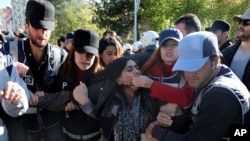The United States joined other countries Fridayincluding France, Germany and the United Kingdomand the United Nations in expressing concern about Turkey's arrest of pro-Kurdish politicians and throttling of the internet.
Following overnight raids, Turkish police detained a dozen parliamentary deputies of the pro-Kurdish HDP (the Peoples' Democratic Party), the country's third largest political party. Among those arrested were HDP co-leaders Selahattin Demirtas and Figen Yuksekdag.
The incidents prompted Deputy Secretary of State Antony Blinken to speak to his Turkish counterpart to express concern, asking Ankara to "reinforce the public's confidence in rule of law," said State Department spokesman John Kirby.
"The United States is deeply concerned by the Turkish government's detentions of opposition members of parliament, including the co-chairs of the HDP and by government restriction on internet access today," Kirby told reporters while referring to Turkey as a "friend and ally."
Bomb explosion
Hours after the roundup, a car bomb killed nine people and wounded more than 100 others near a police station in the southeastern Turkish city Diyarbakir, where some of the lawmakers were being held.
Turkish Prime Minister Binali Yildirim said Kurdish militants were responsible for the bombing, and that one suspected member of the outlawed Kurdistan Workers Party (PKK) was killed in the blast. However, later on Friday, the Islamic State group claimed responsibility for the attack.
The HDP lawmakers were taken into custody after failing to respond to summons by prosecutors asking them to testify in a terrorism propaganda case, according to a statement issued by a government office.
HDP spokesman Ayhan Bilgen called the detentions an attempt to provoke civil war.
The U.N. human rights office says the move against the politicians, combined with the earlier detention or suspension of more than 110,000 officials since a failed coup in July, may "go beyond what is permissible."
Non-governmental organizations are also condemning the detention of the lawmakers.
"Detaining democratically-elected members of parliament without clear evidence of serious wrongdoing is a very fundamental assault on the right to political representation," Emma Sinclair Webb, chief Turkey researcher for U.S.-based Human Rights Watch, told VOA. "Removing the possibility of representation and participation in political life for millions of voters has serious consequences for democracy and human rights."
Turkey's Justice Minister Bekir Bozdag, however, defended the detentions, saying they conform with Turkish law.
Small protests
The arrests of the HDP leaders on Friday prompted a series of small protests in several Turkish cities and outside Turkey's embassy in Washington.
Spreading word inside Turkey about the protests was hampered by much of social media, including Twitter and Facebook, being shut down or severely curtained there.
The controls will remain in force until "the terror threat" subsides, Prime Minister Binali Yildirim announced on Friday.
Internet throttling -- the intentional slowing of internet service -- is"another act in what we have continued to see as a worrisome trend," said Kirby at the State Department.
Turkey has been under emergency rule since the failed coup. There has been a widening crackdown on dissent by President Recep Tayyip Erdogan, who blames the attempted overthrow of his government on Fethullah Gulen, a Turkish cleric who lives in the U.S. state of Pennsylvania.
The government in Ankara has repeatedly called for the United States to extradite Gulen and warns that failure to do so will cause great harm to relations between the two countries.
Dorian Jones in Istanbul contributed to this report.

